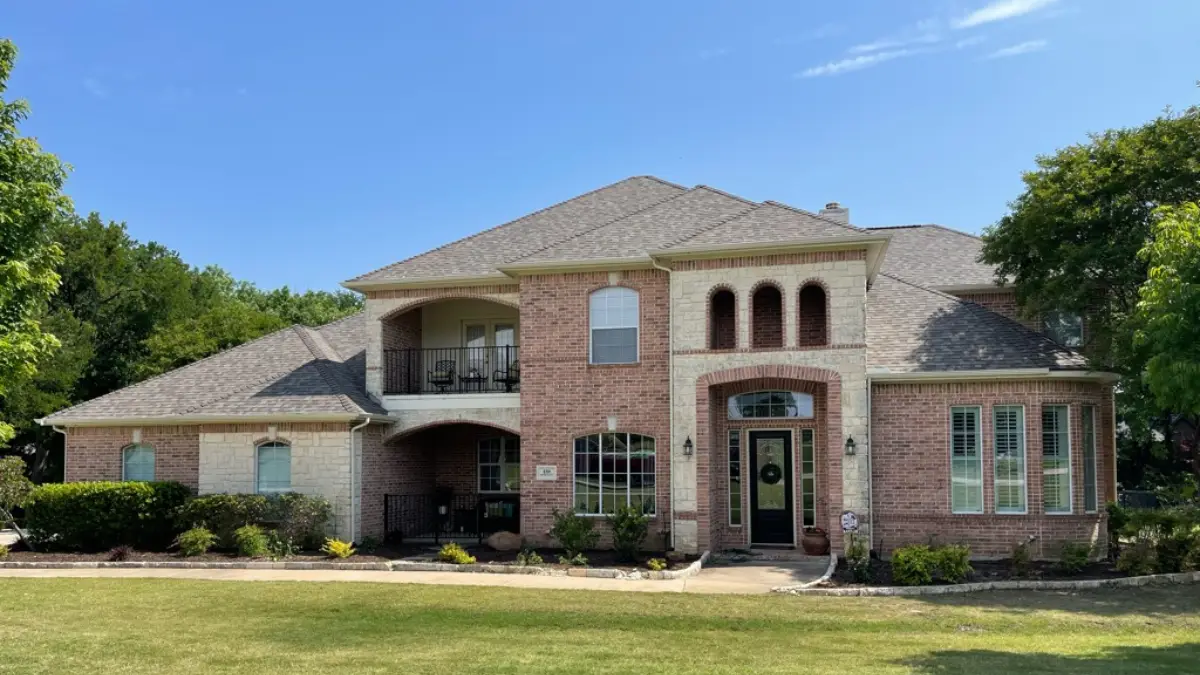When it comes to maintaining a home in Texas, understanding the cost of repairing a roof is crucial. Roof damage can occur due to severe weather conditions, ageing materials, or poor installation, leaving homeowners wondering about the financial impact. This overview aims to shed light on the expenses associated with roof repair in the Lone Star State. Additionally, roof replacement in Texas is a significant aspect of home maintenance, often involving considerations like average costs, permits, and financing options.
In this How Much Does It Cost to Repair a Roof in Texas guide, Homeowners seeking roof repair in Texas will find valuable insights. It covers average repair costs, common roofing issues specific to the region, and a breakdown of expenses. Additionally, it provides tips for choosing the right roofing contractor and navigating the roof repair process. By the end, readers will have a clearer picture of what to expect when tackling roof repairs in Texas.
Average Roof Repair and Replacement Costs in Texas
Typical price range
The cost to repair a roof in Texas varies widely, typically ranging from $6,000 to $20,000. Most homeowners spend around $12,000 to replace a 2,000 sq. ft. shingle roof. For a more specific estimate, the typical replacement cost in Texas falls between $195 and $295 per square (a 10-foot square area). It’s worth noting that about 40% of the total cost goes to materials, while 60% covers labor expenses. The roof replacement cost in Texas is influenced by various factors such as location, roofing materials, and house size, with average cost ranges varying for different types of roofs.
Factors affecting costs
Several factors influence the overall cost of roof repairs in Texas. These factors can significantly impact the final average roof replacement cost.
- Roof size and complexity: Larger roofs or those with intricate designs require more materials and labor, increasing costs.
- Roofing material: The choice of material significantly impacts the price. Asphalt shingles are the most economical option, costing around $3.50 to $5.50 per sq. ft. More premium materials like wood shake, metal, or tile can cost up to $20 per sq. ft.
- Roof pitch: Steeper roofs are more dangerous and time-consuming to work on, leading to higher labor costs.
- Accessibility: Roofs that are difficult to access may require special equipment, increasing the overall expense.
- Existing damage: Hidden structural damage or water damage can add to the final cost.
Regional variations
Roof repair costs can vary within Texas due to several factors:
- Local labor rates
- Availability of roofing materials
- Building codes and requirements
- Complexity of roofing projects
- Demand for roofing services
- Regional climate factors
- Permit costs and regulations
The Texas roof replacement cost is influenced by location, with rural areas typically incurring lower roof replacement costs compared to urban regions.
Cities like Dallas and Houston may have different pricing structures due to these factors. Additionally, areas prone to hail storms or wildfires may require specific materials, affecting the overall cost of roof materials.
Common Roof Repair Issues in Texas
Texas homeowners face unique challenges when it comes to roof maintenance due to the state’s diverse climate and environmental factors. Understanding these common issues can help in early detection and timely repairs. These issues can also indicate when it might be time for a new roof.
Weather-related damages
The Lone Star State experiences extreme weather conditions that can severely impact roofs. Intense heat, storms, and occasional hail are primary culprits. These elements can cause shingles to dry out, become brittle, and eventually crack or break. High winds during storms can damage or completely remove shingles, leaving the underlying layers exposed. Hail can be particularly destructive, sometimes punching holes through the entire roof structure.
Age-related wear and tear
As roofs age, they become more susceptible to damage. The scorching Texas sun accelerates this process, causing materials to deteriorate faster. Thermal expansion due to significant temperature fluctuations leads to cracks and other structural issues. Skylights and roof vents are particularly vulnerable areas, often developing leaks over time. Regular inspections can help identify these age-related problems before they escalate.
Poor installation problems
Many roofing issues stem from improper installation. A poorly installed roof can lead to premature leaks, reduced lifespan, and increased maintenance costs. Common installation errors include incorrect shingle placement, inadequate ventilation, and improperly sealed flashing around chimneys and vents. As roofing expert John Smith notes, “A well-installed roof is the first line of defense against weather and time.” Hiring certified professionals for installation and repairs is crucial to prevent these issues and extend the roof’s lifespan.
Breakdown of Roof Repair Expenses
Roofing Material Costs
The choice of roofing material significantly impacts the overall cost of roof repair in Texas. Asphalt shingles are the most economical option, typically costing $80 to $100 per square (100 square feet). Metal roofs, while pricier at $100 to $800 per square, offer longevity and heat deflection. Tile roofs range from $600 to $800 per square, providing durability but requiring additional structural support. Slate tiles, known for their high cost and premium status, offer exceptional durability and aesthetic appeal, making them a significant investment in home quality and value. Wood shingles fall between $250 and $600 per square, offering natural insulation but demanding regular maintenance.
Labor costs
Labor makes up 50% to 70% of the total roof repair cost. Roofing labor costs range from $2.00 to $3.50 per square foot on average for shingle installation, excluding materials and supplies. For metal roofs, labor costs increase from $4.00 to $8.00 per square foot. Tile roof installation is the most labour-intensive, costing $500 to $1,700 per square for labour alone. Factors such as roof pitch, accessibility, and complexity can increase labor costs. Steep, multi-story, or difficult-to-access roofs require extra safety precautions and equipment, leading to higher expenses.
Additional fees and permits
In Texas, obtaining a permit is mandatory for roof replacement. Permit fees typically range from $400 to $1,000, varying by location. These costs are usually handled by the roofing contractor and included in the overall pricing. The permitting process ensures compliance with building codes and safety regulations. Homeowners should also budget for roof removal costs, which range from $1 to $5 per square foot, depending on the existing material and roof condition. It’s crucial to factor in these additional expenses when planning a roof repair or replacement project.
Choosing the Right Roofing Contractor
Licensing and insurance
In Texas, roofing contractors are not required to have a state license. However, reputable contractors often obtain voluntary certifications to demonstrate their commitment to professionalism. The Roofing Contractors Association of Texas (RCAT) has developed a licensing program to increase consumer protection through voluntary self-regulation. To obtain an RCAT license, contractors must meet strict requirements, including being a principal in a roofing company for at least three years, submitting references, and providing proof of financial responsibility.
When selecting a roofing contractor, homeowners should verify their licensing and insurance. Check if the contractor holds certifications from recognized industry organizations such as RCAT or the National Roofing Contractors Association (NRCA). These certifications indicate adherence to industry standards and best practices. It’s crucial to ensure the contractor has both general liability insurance and workers’ compensation insurance to protect homeowners from liability in case of accidents or damages during the project.
Experience and reputation
Experience is a key factor in ensuring a successful roofing project. Roofing Contractors with a long history in the business are more likely to have encountered and resolved a wide range of roofing issues. When evaluating a contractor’s experience, consider the following:
- Years in business: A longer track record often indicates reliability and stability.
- Specialization: Ensure the contractor has experience with your specific type of roofing material or project.
- Local knowledge: Familiarity with local climate and weather patterns is crucial for addressing issues unique to the area.
Getting multiple quotes
To make an informed decision, homeowners should obtain detailed written estimates from at least three different roofing contractors. This allows for price and service comparisons and ensures transparency in charges. When reviewing quotes, pay attention to the scope of work, materials used, and any additional services offered.
Conclusion
Navigating the world of roof repairs in Texas can be a complex task, but armed with the right information, homeowners can make informed decisions. The cost of roof repair varies widely, influenced by factors such as materials, labor, and regional differences. Understanding common issues like weather damage and poor installation can help in early detection and timely repairs, potentially saving money in the long run.
Choosing the right roofing contractor in Texas is crucial to ensure quality work and value for money. By checking licenses, insurance, and getting multiple quotes, homeowners can find a reliable professional to handle their roofing needs. Remember, investing in proper roof maintenance and repair not only protects your home but also enhances its value. With these insights, Texas homeowners can approach roof repairs with confidence, knowing they’re well-equipped to make the best decisions for their homes and budgets.


